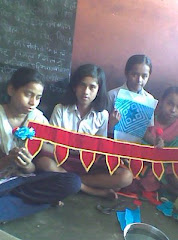By Shree Venkatram
The message was clear: “You will have to help yourself if you want to change things. Nobody else will do it for you.” Sam Pitroda was interacting with a group of about 50 children from Delhi’s slums and surrounding villages who met him in his office at the Knowledge Commission at his invitation.
“Do not tell me the problems. We all know them,” he responded when a young girl said ‘corruption was a big problem’. “Tell me how can it be dealt with?”
“We have to tell people not to give bribes. We have to change them,” said a young voice.
“You cannot change others. You have to change yourself,” remarked the visionary who brought the telecom revolution to India.
“If 50 of us decide never to bribe anyone or to accept bribes, we would have made a beginning,” he told the group.
He told them about the time when he went to a village as Rajiv Gandhi’s special advisor. “The village pradhan had prepared a long list of things that were not available in the village and he proceeded to read them out in front of a large gathering, thinking I would be able to set them right.
“I said: ‘I can’t. It is in your hands. If the teacher does not come to the school, has any villager ever volunteered to teach the students?’”
“In villages where there is no school, does anyone say, ‘My house is available for three hours everyday to run the classes’?” he questioned.
He told the children the meeting with them was part of a consultative process to learn from them their views and goals which would feed into the recommendations made by the Knowledge Commission to the Prime Minister.
“How could one improve the education system,” he asked.
A teenaged boy replied: “Education should be based on practicals, and not be rote based as it is at present.”
“Good,” said Pitroda.
“When we ask questions to our teachers we are made to shut up with either ‘you ask too many questions’ or ‘there is no answer to why’,” the young ones were quick to point out.
“Parents should let us pick the courses of our choice,” said another.
Pitroda could not have agreed more. He said, “Parenting in India has to change. The Indian parents do not allow their children to explore. They are constantly giving instructions.”
“But Sir, you should be telling that to our parents,” they pointed out.
“Yes, my next meeting should be with parents,” he said.
The children were inquisitive about him. One little girl asked: “What was the toughest day of your life?” The man was stumped. “No one has ever asked me that before. It was when I had the surgery following my second heart attack. The doctors cut me up here, and here,” he said pointing to his body. “I thought I would never come out of it alive.”
***
At the end of the meeting, I seek out the little girl. She stands less than 4 feet tall and looks barely eight. Priyanka turns out to be 11 years old and is badly undernourished. Her father is a tailor. An NGO is financing her studies as her family is too poor to send her to school.
“What has been your toughest day?” I ask her. She gives me a dazzling smile. “I haven’t had any,” she says.
No wonder Pitroda has such faith in India’s children.
The message was clear: “You will have to help yourself if you want to change things. Nobody else will do it for you.” Sam Pitroda was interacting with a group of about 50 children from Delhi’s slums and surrounding villages who met him in his office at the Knowledge Commission at his invitation.
“Do not tell me the problems. We all know them,” he responded when a young girl said ‘corruption was a big problem’. “Tell me how can it be dealt with?”
“We have to tell people not to give bribes. We have to change them,” said a young voice.
“You cannot change others. You have to change yourself,” remarked the visionary who brought the telecom revolution to India.
“If 50 of us decide never to bribe anyone or to accept bribes, we would have made a beginning,” he told the group.
He told them about the time when he went to a village as Rajiv Gandhi’s special advisor. “The village pradhan had prepared a long list of things that were not available in the village and he proceeded to read them out in front of a large gathering, thinking I would be able to set them right.
“I said: ‘I can’t. It is in your hands. If the teacher does not come to the school, has any villager ever volunteered to teach the students?’”
“In villages where there is no school, does anyone say, ‘My house is available for three hours everyday to run the classes’?” he questioned.
He told the children the meeting with them was part of a consultative process to learn from them their views and goals which would feed into the recommendations made by the Knowledge Commission to the Prime Minister.
“How could one improve the education system,” he asked.
A teenaged boy replied: “Education should be based on practicals, and not be rote based as it is at present.”
“Good,” said Pitroda.
“When we ask questions to our teachers we are made to shut up with either ‘you ask too many questions’ or ‘there is no answer to why’,” the young ones were quick to point out.
“Parents should let us pick the courses of our choice,” said another.
Pitroda could not have agreed more. He said, “Parenting in India has to change. The Indian parents do not allow their children to explore. They are constantly giving instructions.”
“But Sir, you should be telling that to our parents,” they pointed out.
“Yes, my next meeting should be with parents,” he said.
The children were inquisitive about him. One little girl asked: “What was the toughest day of your life?” The man was stumped. “No one has ever asked me that before. It was when I had the surgery following my second heart attack. The doctors cut me up here, and here,” he said pointing to his body. “I thought I would never come out of it alive.”
***
At the end of the meeting, I seek out the little girl. She stands less than 4 feet tall and looks barely eight. Priyanka turns out to be 11 years old and is badly undernourished. Her father is a tailor. An NGO is financing her studies as her family is too poor to send her to school.
“What has been your toughest day?” I ask her. She gives me a dazzling smile. “I haven’t had any,” she says.
No wonder Pitroda has such faith in India’s children.
.jpg)




+(2).jpg)


No comments:
Post a Comment